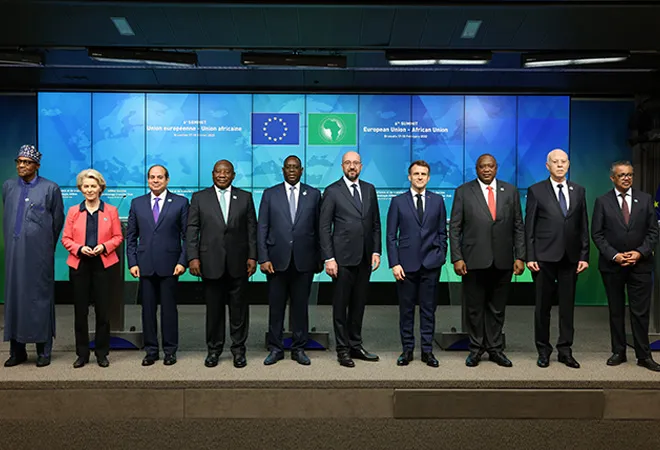
The sixth plenary session of the European Union (EU)-African Union (AU) summit concluded in Brussels on 18 February with the issuing of a “Joint Vision for 2030” that aims to consolidate a “renewed” partnership between Europe and Africa. The summit served an opportunity for the two continents to reboot their ties and deliberate on issues of mutual convergences to bolster trade, development, and create a partnership of equals.
For many decades, Europe had enjoyed the status of being Africa’s pre-eminent external partner. However, throughout the years, this partnership has mostly tended to be unbalanced, rather than an equal one. Europe and Africa’s relationship has predominantly centred on development and aid through successive European Development Funds (EDF) and Economic Partnership Agreements (EPA). These agreements were created in a post-colonial context and has not always resulted in meaningful impact. Twenty-two years have passed since the first EU-AU summit was held in Cairo, Egypt. However, little in bilateral ties have changed for the better. Despite resulting in many action plans and strategic declarations, there continues to be a huge imbalance in EU-Africa trade. The lopsided power dynamics between Europe and Africa has often disadvantaged the AU in setting the agenda and terms of engagement in its partnership.
The EU launched its 300-billion-euro Global Gateway initiative in December 2021 in an attempt to counter the growing Chinese influence, similar to the US President Joe Biden’s Build Back Better World initiative.
The EU-AU summit happened at a time when African countries, leaders, and stakeholders are proactively voicing their demands and asserting their interests vis-à-vis their international partners. Over the course of the past decade, China has already garnered significant influence in the continent through diplomacy and major infrastructure investments. Other countries like India, Japan, Russia, UAE, and Turkey are also increasing their outreach to the continent. Subsequently, the EU launched its 300-billion-euro Global Gateway initiative in December 2021 in an attempt to counter the growing Chinese influence, similar to the US President Joe Biden’s Build Back Better World initiative. Under the Global Gateway, European Commission President Angela von der Leyen has earmarked 150 billion euros for Africa, to fund infrastructure development and investment. The initiative also aims to promote values and norms such as democracy, transparency, good governance, as well as green investment.
Thorny issues persist
While such initiatives have been welcome, the onset of the coronavirus pandemic did witness the souring of diplomatic relations between the two continents. The hoarding of vaccines by EU countries, the discriminatory travel bans against South African countries, the imposition of export restrictions for COVID-19 tools, and the EU’s opposition to a temporary intellectual property (IP) wavier for COVID-19 tools have brought mistrust to the relationship. This is in addition to the failure to reach the promised US $100 billion in annual funding at the 2021 UN Climate Change Conference. Moreover, there has been a realisation on the part of the European leaders that their ambitions on climate and technology would require the support of African stakeholders.
Other contentious issues such as the chronic cycle of instability in Sahel, Europe’s tepid response to support Africa with aid and debt relief, and fear of large amounts of irregular migration, continues to gnaw at the relationship. In the last couple of years, several successful coup d’etat have taken place in countries like Burkina Faso, Mali, Chad, and Guinea, fuelled in part by the collapse of state institutions, corruption, and poorly-funded and under-resourced African militaries. Such instability in parts of the continent has heightened fears of a migration crisis, like that of 2015 when 1.3 million people came to Europe in order to seek asylum.
The hoarding of vaccines by EU countries, the discriminatory travel bans against South African countries, the imposition of export restrictions for COVID-19 tools, and the EU’s opposition to a temporary intellectual property (IP) wavier for COVID-19 tools have brought mistrust to the relationship.
Furthermore, the double standard in offering fiscal stimulus to combat the pandemic was apparent when European countries wrote themselves a fat cheque (26.4 percent of GDP) to bolster their economies, while African countries could only must 3.7 percent of GDP in fiscal stimulus. As David Mcnair argues, such a stark difference in fiscal stimulus package underscores how African countries are largely rule-takers in the global economic architecture in which the EU is a preeminent rule-maker.
Despite these differences, the fact that both sides have recognised and acknowledged the need to develop a strong partnership to tackle some of the biggest challenges of our time across both continents—from the pandemic to climate change—is a welcome development. This suggests a sign of maturity and intent to elevate their partnership and hold difficult discussions on both diverging and converging issues. However, any sort of a real partnership would entail reciprocity as the current European approach is no longer sustainable if it wants to engage with Africa and Africans meaningfully. This is particularly true given that Africa has various international partners that are willing to champion African aspirations by engaging on equal and fairer terms.
Outcomes
During the summit, various commitments aimed at supporting AU member states to respond to COVID-19 and build capacity for future health threats were announced. The most notable was the promise by EU to provide at least 450 million doses of COVID-19 vaccines to Africa in coordination with Africa Vaccine Acquisition Task Team (AVATT) by mid-2022.
The EU also reaffirmed its commitment to mobilise EUR 425 million to ramp up the pace of vaccination and support the efficient distribution of doses as well as the training of medical teams, and analysis and sequencing. This is important since by the start of February 2022, only a meagre 11 percent of the African population were fully vaccinated. Moreover, the WHO also announced that Egypt, Kenya, South Africa, Senegal, Nigeria, and Tunisia would be the first six African countries that will receive the requisite technology for the production of mRNA vaccines on the continent.
The EU also reaffirmed its commitment to mobilise EUR 425 million to ramp up the pace of vaccination and support the efficient distribution of doses as well as the training of medical teams, and analysis and sequencing.
While these commitments on vaccine access and manufacturing were welcome, Europe’s inability to provide any meaningful contribution to stabilising Africa’s Sahel region (stretching from Senegal in West to Sudan in East) continues to be a pressing issue.
Europe’s forever war in the Sahel
The security landscape in the Sahelian region continues to remain perilous and complex as a result of military takeovers and growing jihadist insurgency. Russian-backed Wagner mercenaries’ growing presence in Mali has further complicated the situation. There has not been any dearth of military missions active in the Sahel–the UN’s MINUSMA, French operations Serval (2013-2015) and Barkhane (2014-present), Task Force Takuba (since 2020), and three EU Common Security and Defence Policy (CSDP) missions like EUCAP Sahel Mali, EUCAP Sahel Niger, and EUTM Mali. All of these missions have focused on counter-terrorism, securitisation, and border management. These approaches were initiated by France in 2013 and were premised under the wrong assumption that more hard security was needed to enact real change.
Unfortunately, that change is yet to come. On the day the EU-AU summit kicked off, France announced that it was withdrawing its forces from Mali after almost a decade of battling Al-Qaeda- and Daesh-linked groups in the Sahel. The view from Mali’s military junta is that French mission was ineffective and is now going to relocate to neighbouring Niger. The EU’s securitising rhetoric and actions as opposed to a more development and human-security centric approach has unfortunately further deteriorated the security situation in the Sahel. Unless the EU is able to contribute to better governance and address the root causes of instability (development), it will not succeed in understanding the ways in which it could re-calibrate its military and defence engagement in the Sahelian region.
The EU’s securitising rhetoric and actions as opposed to a more development and human-security centric approach has unfortunately further deteriorated the security situation in the Sahel.
It is no secret that Africa has many security challenges, including the fight against terrorism. The Senegalese President, Macky Sall, in an interview with Deutsche Welle, pointed out that, “If Africa is not secure and at peace, the world will not have peace and security. This includes Europe, because of its proximity , but also America and Asia.” Therefore, it is in European interest to ensure that its efforts are tightly coordinated with the AU, EU, and major powers like the United States.
Any declaration of a “renewed and deeper” partnership between Europe and Africa hinges upon commitment and reciprocity from both sides—the AU would need to adopt a comprehensive Europe strategy whereas must look to involve African partners in European matters. Only then, would European actions succeed in matching its ambitions in Africa.
The views expressed above belong to the author(s). ORF research and analyses now available on Telegram! Click here to access our curated content — blogs, longforms and interviews.




 PREV
PREV


